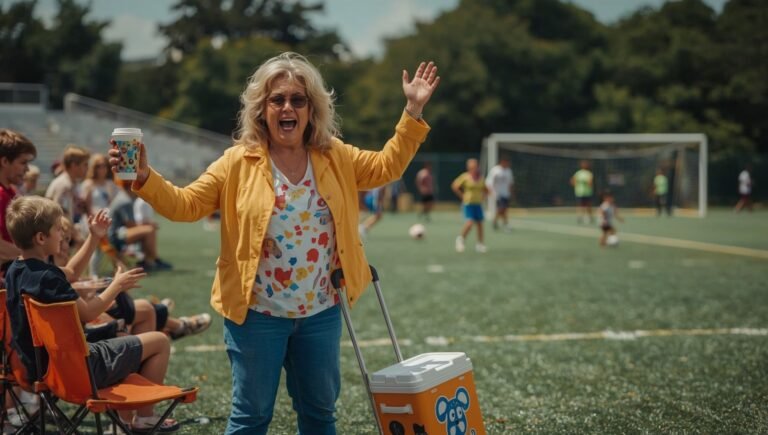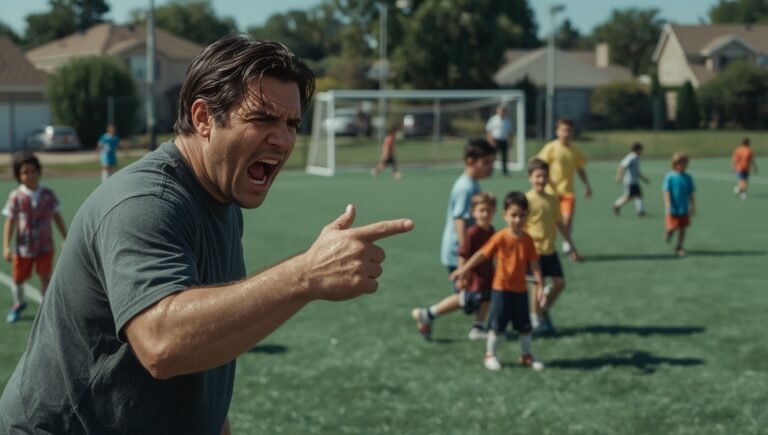
Kids quitting sports is more common than most parents realize. I saw it firsthand when my own son opened up about how he was feeling after a long season.
It was the Monday after the NLF Club Championships, and the adrenaline of the weekend was still buzzing through the air. My son and I walked out of the rink together, the sounds of sticks clattering and skates scraping still echoing faintly behind us. He had that post-tournament glow, flushed cheeks, messy hair, and a grin that said he’d left everything out there on the ice. Then he looked up at me and said, almost offhand but with a spark in his voice: “I love lacrosse so much more.”
In that moment, it wasn’t just a casual remark. It landed with weight, like he was testing the waters of something bigger. I could tell he wasn’t only comparing sports, he was beginning to sort out who he was becoming, what mattered to him, and how much his young life was being pulled in directions by adult-made schedules.
When we got home, he brought it up again to his mom and me. This time, he added fuel to the spark: another kid in the locker room had said, “If you like lacrosse more, then just quit hockey.” That offhand comment was like a match striking, suddenly, the casual thought turned into a real conversation. One that we knew, deep down, was always waiting just below the surface.
As he opened up, my mind flashed back to my own childhood. I remembered the day I quit baseball, and how my dad’s furious reaction only cemented my decision. That was the first time I learned that quitting isn’t always about giving up, it’s often about choosing the right path for yourself. And now, decades later, I found myself sitting on the other side of the conversation. Only this time, I had the chance to do better: to listen, to understand, and to support my son as he figured out his own way forward.
Why Kids Quit Sports (and Why It’s More Common Than You Think)

By age 13, nearly 70% of kids quit organized sports (Aspen Institute Project Play). Think about that, seven out of ten kids step away before they even reach high school fields or gyms. And it’s not because they’re lazy or unmotivated. It’s because somewhere along the way, the joy of the game got buried under pressure and expectations.
When kids first start, sports are magic. They’re giggling in the dugout, chasing snacks at halftime, and celebrating goals like they’ve just won the Stanley Cup. But as they grow older, that magic gets crowded out by long commutes, endless practices, weekend travel, and adults tracking stats like day traders. What started as play slowly shifts into obligation.
That’s why youth sports burnout often peaks between ages 11 and 13. Just as school ramps up, friendships deepen, and kids begin shaping their identity, their calendars explode with practices, games, and year-round commitments. For many, there’s no off-season, just an endless grind with no chance to breathe.
Over scheduled kids in sports aren’t simply tired, they’re stressed, anxious, and sometimes resentful of the very game they once begged to play. Instead of building resilience, the constant push is breaking their spirit. Instead of counting down the minutes to practice, they’re counting down the days until it’s finally over.
“Kids don’t quit because they’re weak. They quit because adults turned play into pressure.”
My Son’s Story: Hockey, Lacrosse, and Too Much Grind

When my son said he loved lacrosse more, it wasn’t about turning his back on hockey. He wasn’t saying, “I quit forever.” What he really meant was, “I can’t live through another year like the last one.”
Last season, hockey swallowed up five days a week while lacrosse got only one. He laid it out to us with a maturity that caught me off guard. He hated rushing home from school, tearing through homework like it was an exam sprint, grabbing a quick bite, and then racing off to hockey. By the time he came home, he was too exhausted to do anything but crash into bed. The next day it started all over again. Wash, rinse, repeat.
Here’s the thing, he’s only 11 years old. And yet he was describing the same relentless cycle adults complain about: work, commute, sleep, repeat. Sports at that age are supposed to give kids joy, confidence, and a release, not mimic the grind of a corporate job.
When he opened up about how draining it was, my wife and I didn’t hear, “I don’t care about hockey.” We heard, “I need balance in my life.” And that’s something every parent of an over scheduled kid in sports needs to pay attention to. Because when a child finds the courage to say, “This is too much,” they’re not giving up, they’re showing self-awareness far beyond their years. And as parents, it’s on us to listen.
The Parent Reaction Trap

This is the moment where so many parents stumble: when their child looks them straight in the eye and says, “I want to quit.” That sentence can hit like a gut punch. Suddenly your brain is spinning: “But we’ve invested so much money in gear!” “What about the team?” “If they quit now, won’t this ruin their future?” In the space of a five-minute car ride, we imagine their entire life trajectory derailing.
And in that panic, parents often overreact. We lash out. We guilt-trip. We deliver a long lecture about commitment and sacrifice. We remind them of all the weekends, gas money, and hotel rooms that have gone into their sport. But here’s the hard truth: piling on pressure rarely brings kids back. If anything, it pushes them further away. The more we treat quitting like a moral failing, the more kids connect the sport with conflict instead of joy. This is exactly why kids quitting sports isn’t always the catastrophe we think it is, it can actually mean they’re brave enough to voice what they need.
I know this because I lived it. When I quit baseball as a kid, my dad absolutely lost it. To him, quitting equaled weakness, wasted talent, and failure. But what it really meant was that he wasn’t listening to me. His anger didn’t motivate me, it pushed me further away. The louder he shouted, the firmer my decision became.
That’s the trap: parents mistake fear for wisdom. We fear our kids will lose opportunities, fall behind, or regret walking away. But when we react from fear, we slam the door on an important conversation. When we respond with calm understanding, we open it wide. We tell our kids: “I hear you. I value what you’re saying. I trust you to know how you feel.”
And let’s be real, sometimes we act like our kid quitting pee-wee hockey is the same as Connor McDavid announcing his retirement. It’s not. It’s an 11-year-old asking for balance, not a headline on SportsCenter. If your child’s biggest “controversy” is deciding to cut back on practices, congratulations, you’re doing okay as a parent.
“Parents sometimes act like quitting pee-wee hockey is the same as walking away from a $50 million NHL contract.”
Top 10 Sports Parent Meltdowns That Deserve an Emmy
Why Quitting Doesn’t Equal Failure

One of the hardest lessons for parents to accept is that quitting a sport doesn’t mean failure. For kids, stepping away can actually be a sign of maturity, self-awareness, and strength. It shows they’re paying attention to their own needs, their bodies, their feelings, their happiness and that they’re confident enough to voice it. That’s not weakness. That’s courage.
Think about it: would you rather see your child drag themselves through endless practices with zero joy, just to prove they “stuck it out”? Or would you rather see them make a thoughtful decision that keeps them healthy, motivated, and balanced? Sometimes “quitting” is really just them choosing balance over burnout and that’s a skill that will serve them their whole lives.
The research backs this up. Kids who specialize in one sport too early are significantly more likely to face injuries, mental fatigue, and eventually walk away from sports altogether. On the other hand, kids who are allowed to explore multiple sports or even step away for a season, often remain active for much longer. They build a healthier, more sustainable relationship with athletics.
So when we hear about kids quitting sports, it doesn’t have to sound like a failure story. More often, it’s a growth story: a child discovering balance, passion, and the courage to make choices for themselves. In the long run, that matters more than another season’s stats or medals.
How Parents Can Handle the Conversation

So your child comes to you and says they want to quit. Now what? This moment can feel like a curveball you weren’t ready for. Instantly, your brain floods with questions: “What about the team?” “Didn’t we spend a fortune on gear?” “Will this hurt their chances later?” It’s easy to panic. But how you respond here will shape not only their relationship with sports, but also their trust in you.
First, remember: kids quitting sports is not the end of the world. It’s not a crisis. It’s not ESPN breaking news. It’s your child saying, “Something here doesn’t feel right.” And that deserves a calm, thoughtful response, not a lecture.
Here are a few ways to handle it without turning your living room into a courtroom:
Listen first. Bite your tongue, put the whistle away, and let them speak. It sounds simple, but it’s harder than it looks. Most of us are programmed to jump in with advice or correction before they’ve even finished the first sentence. Instead, give them the floor. Sometimes, kids don’t need solutions right away, they just need to be heard without interruption. When a child feels listened to, their walls come down, and that’s when honesty pours out.
Ask smart questions. The classic parent response is, “Why are you quitting?” But that’s loaded with judgment. It puts kids on the defensive instantly. Instead, ask open-ended, compassionate questions: “What’s been hardest for you?” or “What part of this do you still enjoy?” These questions invite conversation instead of shutting it down. They also help your child separate the sport itself from the circumstances around it, giving you real insight into what’s actually wrong.
Separate the sport from the schedule. This one is huge. Many kids don’t hate the game—they hate the grind. There’s a big difference between loving hockey and hating five practices a week stacked on top of homework, dinner, and bedtime. Cutting back isn’t the same as quitting forever. Sometimes trimming the schedule is all it takes to bring the fun back. Balance is everything, and recognizing that doesn’t make your child weak, it makes them wise beyond their years.
Stay calm. Easier said than done, right? But your reaction is everything. If you go full coach-mode and start barking orders or lecturing, they’ll shut down in seconds. If you roll your eyes or throw guilt at them, you’ll lose their trust. But if you respond with empathy, if you show that you’re calm enough to listen and steady enough to guide, they’ll keep talking. Humor helps here too. Remind yourself: your 11-year-old isn’t announcing a sudden retirement from the NHL. They’re just asking for a breather.
At the end of the day, the real victory isn’t locking them into a sport they dread. It’s teaching them that their voice matters, their feelings count, and they can trust you to listen. That’s the kind of lesson that outlasts any trophy.
The Bigger Picture: What Really Matters
Youth sports aren’t really about scholarships, trophies, or highlight reels, at least, they shouldn’t be. At their best, they teach lessons that last a lifetime: teamwork, resilience, discipline, friendship, and the joy of being part of something bigger than yourself. But those lessons can get lost if the journey feels like nonstop stress.
When kids quit sports, it’s easy for parents to feel like something’s gone wrong. But often, it means something’s going right. It means your child is learning to prioritize their own well-being, to recognize when something isn’t working, and to have the courage to change course. That’s not failure, that’s growth in action.
Think about it this way: the end goal was never to raise the next MVP. It was to raise a healthy, happy human who knows how to make good choices for themselves. If sports can help teach that, fantastic. And if stepping back from a sport is what it takes to teach that, that’s just as valuable.
We, as parents, have to check ourselves. Why did we sign them up in the first place? Was it for fun, health, and friendships or for glory, bragging rights, and college dreams? If it’s the first set of reasons, then letting go when the joy is gone isn’t losing. It’s winning in a different way.
Because here’s the bigger picture: our kids’ lives are more than scoreboards and schedules. They’re about discovering who they are, what lights them up, and how to find balance in a demanding world. Supporting that discovery, whether it means playing, switching, or even quitting, is the ultimate job of a parent.
Final Thoughts

My son may lean more into lacrosse. He might step back from hockey, or he may find a balance that lets him enjoy both without burning out. The truth is, his choice doesn’t scare me, it reassures me. Because it tells me he’s listening to himself, and he trusts us enough to say it out loud.
At the end of the day, kids quitting sports isn’t the end of their story. It’s often the beginning of them writing their own. It’s a turning point where they discover passion, balance, and self-awareness. As parents, our job isn’t to hand them a playbook with every move mapped out. It’s to stand on the sidelines, cheer them on, and give them the freedom to make choices, even if those choices look different than what we imagined.
Because real success isn’t measured in goals scored or games played. It’s measured in raising kids who know themselves, value their happiness, and have the courage to choose their own path. And when they do that, everybody wins.
Frequently Asked Questions (FAQ)
Why do kids quit sports?
Studies show that nearly 70% of kids quit sports by age 13. The top reasons aren’t laziness, they’re burnout, over scheduling, pressure from adults, and simply not having fun anymore. When play starts to feel like work, kids walk away.
How do I know if my child is burned out?
Burnout often shows up as constant fatigue, irritability, declining grades, or suddenly dreading practices they once loved. If your child treats every game like a chore, it’s a red flag that they’re overwhelmed.
Should I force my kid to stick with a sport?
No. Forcing rarely reignites passion. It usually builds resentment, toward the sport and sometimes toward you. Supporting their choice, even if it means stepping back, strengthens trust and teaches them that their voice matters.
Is quitting sports really a bad thing?
Not at all. Quitting doesn’t equal failure. Often, it’s the healthiest choice a child can make. Kids quitting sports can mean they’re brave enough to choose balance, happiness, and long-term well-being over short-term expectations.
What if my child just wants more balance?
That’s common. Many kids don’t want to quit sports entirely, they just want a less demanding schedule. Cutting down on practices or exploring multiple sports can restore fun while avoiding burnout.
Will quitting hurt my child’s future?
Not in the way parents fear. Most kids won’t go pro or land a scholarship, but all kids can benefit from learning self-awareness and balance. In fact, making thoughtful decisions about their time and energy is a skill that will serve them for life.
Key Takeaways for Parents
- Kids quitting sports is normal. Nearly 70% walk away by age 13, usually because of burnout, pressure, or overscheduling—not laziness.
- Balance matters more than trophies. A packed schedule can drain the joy from the game. Cutting back often helps more than pushing harder.
- Quitting doesn’t equal failure. It can be a sign of maturity and self-awareness, teaching kids to choose balance and happiness over burnout.
- Your reaction shapes everything. Listen first, ask thoughtful questions, and stay calm. Support builds trust—panic pushes kids away.
- The real goal of youth sports: raising healthy, happy kids who know themselves, not just athletes chasing the next medal.








